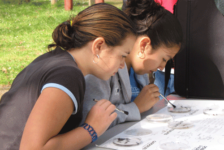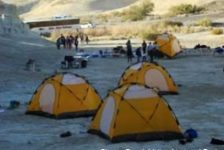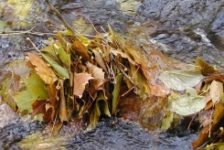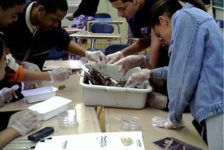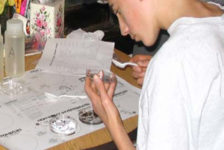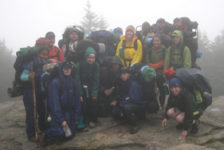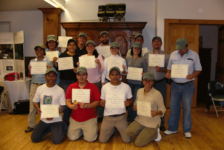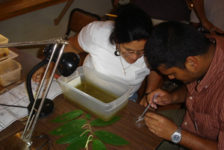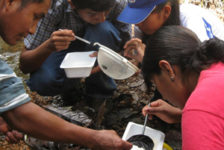This article is reprinted from the Riverkeeper newsletter, Spring 2006.
By Bill Wegner
The Leaf Pack Network brings a real-world connection to students and their watersheds, fosters a sense of ownership and responsibility for water resources, and provides information to citizens interested in local environmental quality as well as to organizations seeking information on water quality.
In 2000, Riverkeeper, the Stroud Water Research Center (Stroud), and Hudson
Basin River Watch partnered to implement the New York City Watershed Leaf Pack Network, a program developed by Stroud to harness kids’ fascination with bugs in order to measure water quality in the New York City Drinking Water Supply Watershed.
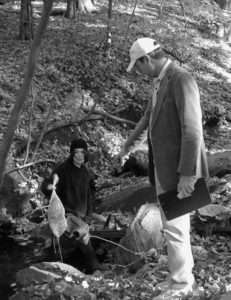
Mahopac High School conducting a Leaf Pack Experiment
In fall and/or spring, school students place plastic mesh bags of leaves in streams. After two to three weeks, aquatic insect larvae (macroinvertebrates) colonize the leaf packs as a food source.
Students then retrieve the leaf packs and sort and identify the macroinvertebrates, each species of which has been assigned a pollution tolerance index that reflects its sensitivity or tolerance to water pollution.
By monitoring the richness and diversity of the species that colonize the leaf packs, students are able to generate a biotic index of stream health. The schools then post their data on Stroud’s website to share data and compare the health of their streams with other watershed streams.
Beyond the obvious educational benefits, the database is complementary for assessing the regional health of streams and their watersheds. The goals of the Leaf Pack Network are to:
- promote student inquiry by using scientific methods involving observational and explanatory activities
- raise awareness of the importance of streamside forests to the ecology of rivers and streams and to promote their stewardship
- develop a diverse and dynamic network of groups that share information about their streams using the Internet
- use the Leaf Pack Experiment kit and other teaching resources to improve science education and teacher professional development.
Teachers in the New York City watershed receive free training and Leaf Pack Experiment kits, which include all of the sampling equipment and identification materials for their school classes. Now in its sixth year, the Leaf Pack Network has some 40 school classes and volunteer groups sampling streams in the New York City watershed.
Riverkeeper also partnered with a Kodak-sponsored Seeing Necessary Alternatives Photographically (SNAP) program, which provides cameras and film processing for students to document their Leaf Pack Experiments. In addition to providing display boards featuring student photos, which we use to showcase the Leaf Pack Network on websites and at water quality-related events such as Riverkeeper’s annual Shad Festival, SNAP is currently featuring the Leaf Pack Network in a nationwide series of traveling exhibits.
With funding for the program secured through 2010 with a Safe Drinking Water Act grant, the Leaf Pack Network partners are now focused on expanding the program to involve New York City water consumers by bringing City school groups into the New York City watershed to sample with Leaf Packs at environmental education camps such as Teatown Lake Reservation in Yorktown, Clearpool Education Center in the Town of Kent, and the Catskill Center in Arkville, Delaware County.
Our plans also include the development of a Stream Day exhibit in New York City, which will showcase the Leaf Pack Network for City school students and water consumers. Other events include East and West-of-Hudson student watershed congresses — all-day festivals the goal of which is to highlight watershed school Leaf Pack projects and to make connections between the efforts to protect the water sources and the social, economic and environmental well being of the watershed communities.
Another outreach project we are planning for 2007 is the New York Watershed Expedition — an expedition by land, water, bike and rail that will follow the drinking water from watershed sources to the end consumers. This extended trip will pair students from New York City with students from the Catskills, and chaperones will include a Stroud scientist, a leader experienced in leading student hiking and camping trips, a back country cook and others. To maximize the overall experience for the participants, we will seek students who have different interests, expertise and backgrounds.
Each student will keep a personal journal, and each will be a member of a team that chronicles water and watershed issues. They will collectively be telling the story of New York City’s drinking water, the places from which it comes and the lives of the communities through which it flows as it moves from mountaintop to tap.
The Leaf Pack Network brings a real-world connection to students and their watersheds, fosters a sense of ownership and responsibility for water resources, and provides information to citizens interested in local environmental quality as well as to organizations seeking information on water quality. Ultimately, we hope our efforts will serve as a model that can be applied across the country in many different watersheds. For more information on the New York City Watershed Leaf Pack Network, visit our website.
Learn more:



